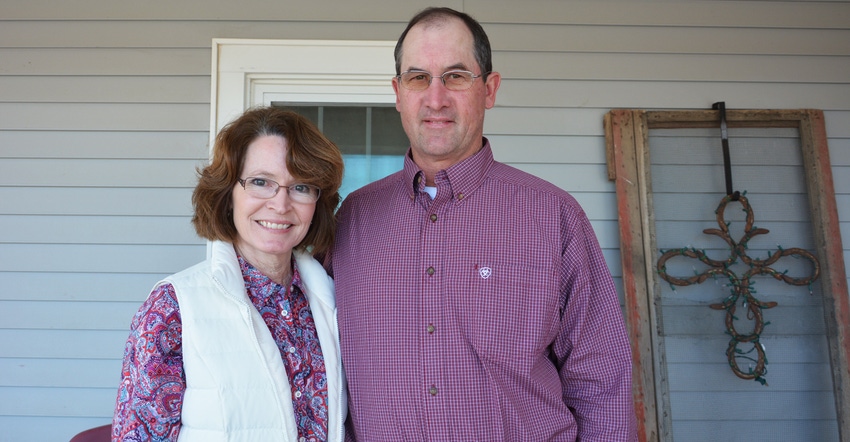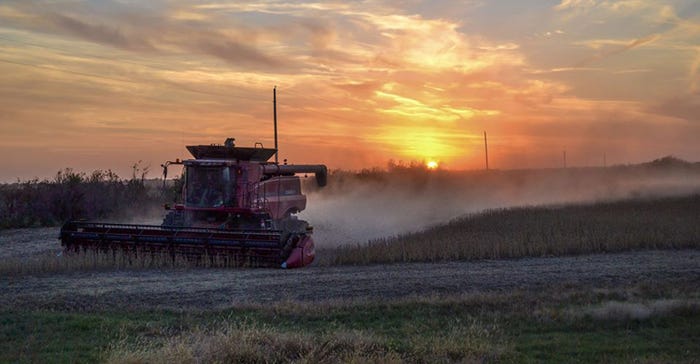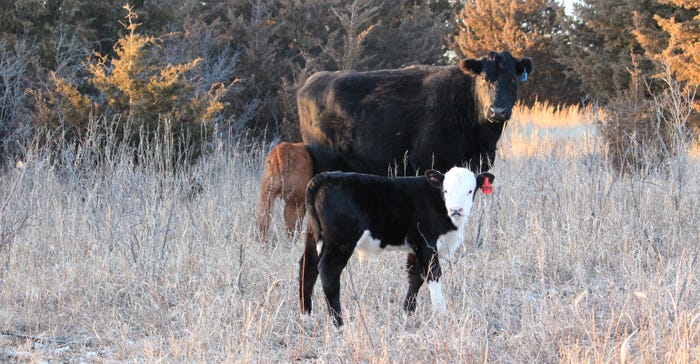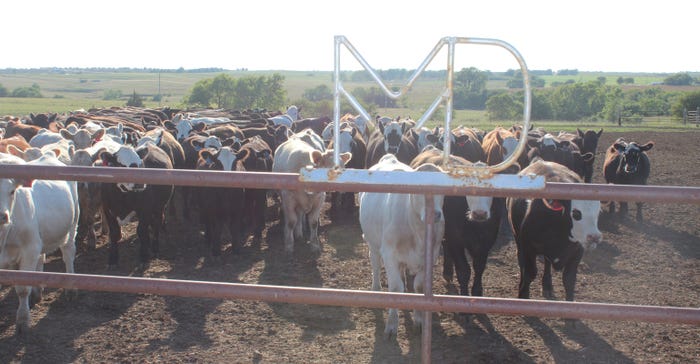
Mark Diederich is the fifth generation of his family to live on and operate the homestead farm founded by his ancestors in Washington County. But even though he and his wife, Evelyn, are proud of that legacy and history, they are in no way bound by the methods of the past.
In fact, quite the opposite. “I am constantly seeking a better way,” Mark says. “Information, experience and ideas are essential to achieving this goal. I network with nutritionists, veterinarians, cattle breeders, agronomists, insurance and financial specialists. I have called upon our county Extension and state Extension in animal science, agronomy, economics and engineering to greatly benefit our operation. I have taken concepts form the dairy and swine industry and modified them to apply to our beef operation. I am open to new ideas and don’t mind thinking outside the box.”
On the Mark Diederich Family Farm, you will find total no-till operation with cover crops, tillage radish and high concentration rotational grazing to increase organic matter and improve soil health.
 LONG DAYS: On the Diederich farm, as on other farms in Kansas, harvest is a time of long days and hard work. And incidentally, beautiful photos.
LONG DAYS: On the Diederich farm, as on other farms in Kansas, harvest is a time of long days and hard work. And incidentally, beautiful photos.

He has rotation grazed pastures and allowed grass to regrow along stream banks and ponds, flash-grazed sudan fields in cells to uniformly spread manure and build soil organic matter, and planted grass buffer strips. In addition, Mark has designed and developed a modified, confined cow operation that produces replacement heifers and finishes out cull heifers and steers, a system that was developed as a response to an economic limitation.
“Traditionally, the number of cow-calf units a ranch will run is determined by the number of acres available to graze,” Mark says. “With today’s land prices, it is not financially feasible to purchase grass for expansion of a cow herd. The semi-confined cow system that I have developed is an economic fit in the current environment. It is a low-cost system with multiple areas in which to add value to the cattle operation. Through the use of synchronization and AI, this system can be used to produce exceptional replacement heifers or a total terminal cross. Being willing to think outside the traditional cow-calf production box has created an opportunity to expand our cow herd in a cost-effective manner.”
When Mark began working on the system in 2011, he found there was no place to turn for information because it hadn’t been done before.
“Through trial and error and much adjusting, a system of confined cow production came together,” Mark says. “We created a facility to contain the cows while allowing the calves to graze or feed in the segregated areas of the pasture. They are free to enter and exit the cow containment area through modified gates. We built bunks that greatly reduce feed waste. We created limited feed and grain-based diets that allowed us to be more cost effective while cutting down on waste produced.”
He says most producers looked at the concept as a novelty at first, but as it has been shown to have high reproduction efficiency, good herd health and calf performance, there has been increasing interest from other cattlemen.
 TOP NOTCH CATTLE: Working outside the box to develop a system of raising cattle with fewer acres of pastures has been an major achievement for Mark Diederich.
TOP NOTCH CATTLE: Working outside the box to develop a system of raising cattle with fewer acres of pastures has been an major achievement for Mark Diederich.

“We have been willing to answer all questions and share our experiences in order to help other producers be successful,” he says.
Even as the family has tried to learn, stretch and innovate, they have held to tradition.
Evelyn grew up in Colby, attended Colby Community College and then Kansas State University, where she ended up with a degree in medical technology. She was working at St. Mary’s Hospital in Manhattan when she and Mark were married in 1989.
When they first moved back to begin farming in 1990, they rented a home in Greenleaf, but by 1992 they had moved into Mark’s grandparents’ home on the farm, and Evelyn was working at the Clay County Hospital in Clay Center. They immediately started a renovation project that included new paint, new flooring and a remodeled bathroom.
“We were excited to move out to the farm where it would be more convenient for Mark to take care of livestock and keep up with the demands of farming,” Evelyn says. By the fall of 1999, however, it was obvious that their growing family needed more space, so they took on the big step of adding a bigger kitchen, a utility room, another bathroom and a 2-car garage.
“It was a stressful experience trying to live in the house while doing a major renovation,” Evelyn says.
Readers who want to think about just how stressful: In 1999, Lea Anne was 9, Ryan was 7, Aaron was 6, Nichole was 2 and Kevin was due in March.
That major remodel added vinyl siding and a wrap-around porch, and utilized limestone for a torn-down barn that had been cut by Mark’s great-, great-grandfather Schroll. In 2004, Evelyn took a job closer to home at the Washington County Hospital to be closer to the children’s activities. She is still working there.
 OUTSIDE THE BOX: A semi-confinement system has worked to help the Mark Deiderich farm build a cow-calf herd without having to invest in additional pasture acres that are not affordable or available.
OUTSIDE THE BOX: A semi-confinement system has worked to help the Mark Deiderich farm build a cow-calf herd without having to invest in additional pasture acres that are not affordable or available.

In 2015, the family renovated the basement, turning storage space into a nice family room, furnace and storage room, a bathroom, and a kitchenette that comes in very handy when kids come home to visit.
“These renovations were not without challenges given the age of the house, but we felt it was worthwhile to update the farm home which has so much family history,” Evelyn says.
Through the years, 4-H has been an important part of Diederich family life. Mark and Evelyn have both volunteered as community and project leaders, and have served on the county fair board.
Evelyn says the family is blessed to have five children and now one grandchild in good health. Four of the five are now employed on the farm. Ryan is full-time while Aaron, Nichole and Kevin are part-time. Both Ryan and Aaron are graduates of K-State.
Only their oldest daughter, Lea Anne, is not involved in the operation. She is a 2013 K-State graduate and was accepted into the University of Kansas’ Occupational Therapy program at KU Medical Center and married her husband, Chad Huffman, in 2014.
She graduated in 2016 with a master’s degree in 2015, after which Lea Anne, Chad and their one-year-old daughter Mary Claire moved to Kingman. Chad farms with his family, and Lea Anne works PRN at Wesley Medical Center in Wichita and the Pratt Regional Medical Center.
The family will be gaining another member in April when Aaron and his fiancé, Sydney Pralle, are married. Sydney works in an insurance agency in Bremen.
The Diederichs say if they could offer any single piece of advice to a new or aspiring farmer, it would be this: “Be prepared for the ups and downs. Not every year is going to be good. You have to have a true love for it.”
About the Author(s)
You May Also Like




